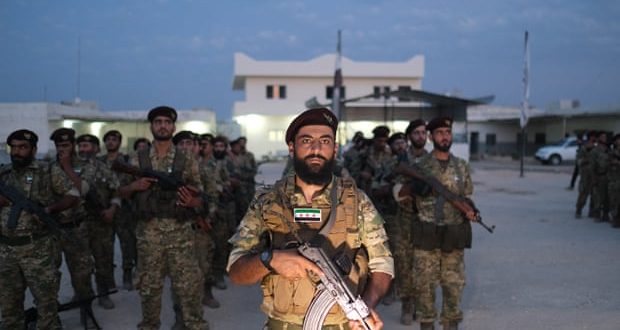Turkey’s president faces some difficult choices after being given green light by the US
For Recep Tayyip Erdoğan, it’s a case of be careful what you wish for. By most accounts, Turkey’s president bamboozled Donald Trump into giving a green light for an invasion of north-east Syria.
Yet now, having got what he wanted, Erdoğan faces some difficult choices. How far to go? Who is the enemy? And how long can such a big operation be sustained? It may be the biggest gamble yet by a politician known for taking risks.
Worried about biting off more than they can chew, Turkey’s representatives are busily redefining and repurposing the military incursion, which began with a series of air strikes on Wednesday. What Erdoğan has for months described as an essential move to eliminate a Kurdish terrorist threat has suddenly been transformed into a “peace operation” primarily targeting Islamic State.
İbrahim Kalın, Erdoğan’s right-hand man, referring to the Syrian Kurdish YPG militia, told CNN: “This is not a move against the Kurds. Turkey doesn’t have any problem with the Kurds. We are fighting [a] terrorist organisation that has killed and oppressed the Kurdish people as well.” As for the main task of fighting Isis, the world should be grateful to Turkey, he suggested.
It’s plain this abrupt change of tack was influenced by the uproar in Washington that followed Trump’s decision. Even normally sycophantic Republicans accused the White House of betraying Kurdish-led forces that hitherto spearheaded the anti-Isis fight. It’s possible Trump gave Erdoğan the go-ahead in order to distract attention from the impeachment inquiry. If so, his ruse backfired.
Turkey has also changed its tune about long-term territorial ambitions in Syria, notwithstanding Erdoğan’s stated intention to create a quasi-permanent “safe zone” potentially 20 miles deep and 300 miles long (32km and 483km). “Turkey has no interest in occupying any part of Syria,” said Kalın, characterising previous cross-border operations in Jarablus and Afrin as mere temporary landgrabs.
Fahrettin Altun, Erdoğan’s director of communications, meanwhile offered assurances that humanitarian considerations were uppermost. “The plan helps Turkey shelter innocent people,” he wrote in the Washington Post. Up to 2 million Syrian refugees now in Turkey would “volunteer” to live in the safe zone, he added – even though most do not have a prior connection with the area.
Kalın also claimed a mass repatriation would take place voluntarily, not under duress, although nobody seems to have asked the people concerned and aid agencies are highly sceptical.
As he prepares to send in the troops, Erdoğan face multiple unknowns. One is whether Turkey has the capacity, let alone the will, to lead the charge against Isis or take control of the detention and refugee camps presently guarded by the Kurds. Ankara is already being blamed in some quarters for jeopardising the fight against Isis.
Like everybody else, Erdoğan has no idea which way Trump may jump next. Similar doubts apply to Russia, which is reportedly supportive but recently clashed with Turkey over operations in Idlib, and to Bashar al-Assad’s Iranian-backed regime in Damascus, which may use the confusion to recapture territory and insert its own forces.
It’s unclear what the Turkish public, already disillusioned with Erdoğan and beset by deepening economic woes, will make of a costly, open-ended conflict that will look to many like an unnecessary war of choice. And if the dire humanitarian consequences predicted by the UN come to pass, Erdoğan surely knows he will bear the blame internationally – and face possible US and EU sanctions.
For all these reasons, Erdoğan will probably tread cautiously at first. He may use Turkish-backed militia fighters from Syria’s rebel National Army, supported from the air, rather than regular Turkish troops in any initial deployment. Reports on Wednesday said the rebels were moving into position. US officials predict there will be no large-scale invasion and any first advance may be limited to establishing combat posts inside Syria.
Only now fully aware, perhaps, of the dangers – personal, political and military – of his high-risk Syria gamble, Erdoğan can be expected to use a White House meeting with Trump on 13 November to try to shore up US support, possibly before making any definitive move. Yet what happens next may be beyond his control. Kurdish leaders insist there will be no retreat. If the Turks come, they say, they will take the fight to them.
The Guardian
 Lebanese Ministry of Information
Lebanese Ministry of Information



